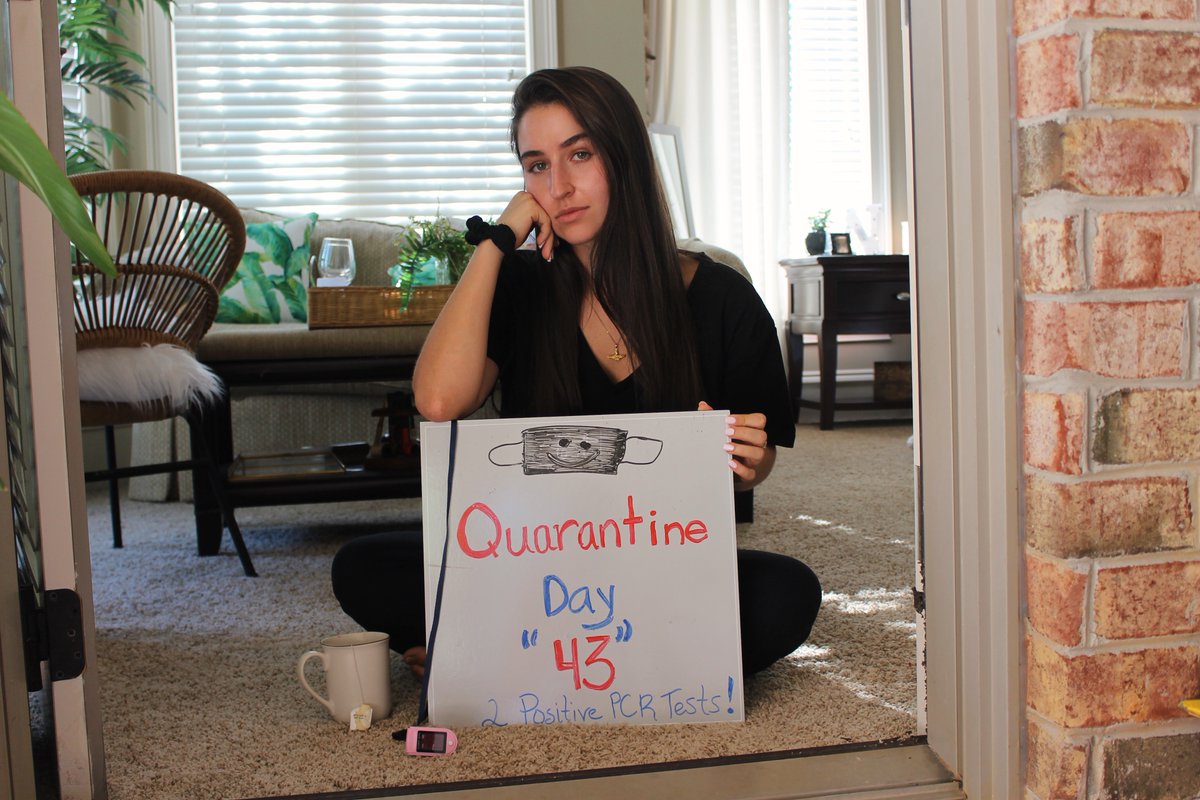THREAD  --> This is Natalie. When I first spoke with her, she hadn't left her parents' basement in 43 days because she'd tested positive for #Covid19 twice and feared infecting her family. Why do folks like her keep testing positive? Here's what I learned. 1/18
--> This is Natalie. When I first spoke with her, she hadn't left her parents' basement in 43 days because she'd tested positive for #Covid19 twice and feared infecting her family. Why do folks like her keep testing positive? Here's what I learned. 1/18
 --> This is Natalie. When I first spoke with her, she hadn't left her parents' basement in 43 days because she'd tested positive for #Covid19 twice and feared infecting her family. Why do folks like her keep testing positive? Here's what I learned. 1/18
--> This is Natalie. When I first spoke with her, she hadn't left her parents' basement in 43 days because she'd tested positive for #Covid19 twice and feared infecting her family. Why do folks like her keep testing positive? Here's what I learned. 1/18
As you probably know, Natalie is not alone. There are numerous reports of patients testing positive multiple times. One San Francisco doctor tested positive for Covid-19 for at least 90 days. #LongCovid #LongHaulers 2/18 http://sfchronicle.com/bayarea/article/The-curious-case-of-the-SF-doctor-who-s-been-15304660.php
For the last two months, I investigated the mystery of why a handful of people who fall ill from Covid-19 still test positive for the virus weeks later. Here is the story, and some highlights follow in this thread. 3/15 https://elemental.medium.com/the-mystery-of-why-some-people-keep-testing-positive-for-covid-19-3c0c11a6bd10
The test that many people receive for #Covid19 uses a technology called PCR. It detects viral genetic material, in the case of #SARSCov2 that means RNA. But frustratingly, it won't tell you if it's finding whole, contagious virus. 4/18 https://discoverysedge.mayo.edu/2020/03/27/the-science-behind-the-test-for-the-covid-19-virus/
To figure out if the viral material is contagious, scientists have to try to grow it in cells. But viruses don't really grow in cells in a dish very well, and doing this kind of experiment for the #Covid19 virus must be done in a high-level biosafety level facility. 5/18
The @CDCgov recently said that people who have mild to moderate symptoms don't need to get retested for the virus, and can assume they are not infectious after 10 days since symptom onset. Here are those guidelines. 6/18 https://www.cdc.gov/coronavirus/2019-ncov/hcp/duration-isolation.html
The recommendations are notably less clear on people with severe disease, but the farthest out that scientists have been able to obtain infectious virus from a #Covid19 patient is 20 days, and that was just ONE patient, who was immunocompromised. 7/18 https://www.medrxiv.org/content/10.1101/2020.06.08.20125310v1
One theory is that the positive PCR tests weeks out from the onset of illness are just picking up on the debris of long-dead #SARSCoV2 virus. Another theory is that a small amount of virus persists for a bit in the body even if the person isn't shedding infectious particles. 8/18
The traditional view has been that only a small subset of viruses persist in the body. For example, the chicken pox virus, which sticks around lifelong, and can reemerge to cause shingles. Herpes simplex viruses also are lifelong infections. HIV, too. 9/18
But strange events have caused scientists to widen their investigation of whether other viruses persist. Hold on to your hats -- it gets weird from here. 10/18
Back in 1969, a respiratory illness struck nine of a dozen men wintering in isolation for 17 weeks (with five huskies, who were fed from a pile of dead seals nearby) at the Adelaide base in the Antarctic. The illness came out of the blue. Photographer: Charles Swithinbank. 11/18
The huskies and dead seals likely had nothing to do with it. I just included that detail to help paint a picture. Anyways, it got researchers wondering how a respiratory virus could come out of the blue and if it had reemerged from one of the men. 12/18
People also never thought about measles as a commonly persistent infection, but autopsies in 1995 on 51 healthy people in Japan who died from accidents found that around half of them had measles in their bodies. 13/18 https://pubmed.ncbi.nlm.nih.gov/9431973/
Notably -- and this is important -- scientists aren't able to recover infectious measles virus from people after initial infection when the rash passes. 

 So just even if a virus persists that doesn't mean people are infectious. 14/18
So just even if a virus persists that doesn't mean people are infectious. 14/18


 So just even if a virus persists that doesn't mean people are infectious. 14/18
So just even if a virus persists that doesn't mean people are infectious. 14/18
Outbreaks of recent pathogens show signs of persistence in some tissues. For example, semen from patients who have had Zika and Ebola has tested PCR positive for those viruses as far out as 281 days and 565 days after initial infection, respectively. 15/18
Does #Covid19 sometimes linger for a bit in reservoirs within the body? It's too soon to tell, and the data are scant. Semen in 6 out of 38 hospitalized Covid-19 patients tested positive for the virus, but another study of semen 8 to 75 days out found no evidence of it. 16/18
Regarding PCR tests: On the one hand, fragments of virus could linger by being bound to proteins that protect them from degradation. On the other hand, Covid-19 is an RNA virus, and RNA degrades quickly (that's why crime scene investigators look for DNA instead). 17/18
Ultimately, some viruses that "persist" might do that only for weeks, rather than forever.
QED: We shouldn't assume that not shedding infectious Covid-19 virus means that SARS-CoV-2 isn't lingering a bit in some form beyond the first week or so in the most severe cases. 18/18
QED: We shouldn't assume that not shedding infectious Covid-19 virus means that SARS-CoV-2 isn't lingering a bit in some form beyond the first week or so in the most severe cases. 18/18

 Read on Twitter
Read on Twitter



